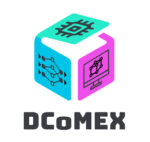DCoMEX aims to provide unprecedented advances to the field of Computational Mechanics by developing novel numerical methods enhanced by Artificial Intelligence, along with a scalable software framework that enables exascale computing. A key innovation of the project is the development of AI-Solve, a novel scalable library of AI-enhanced algorithms for the solution of large scale sparse linear system that are the core of computational mechanics. The methods of the project fuse physics- machine learning with efficient block- iterative methods and incorporate experimental data at multiple levels of fidelity to quantify model uncertainties.
Efficient deployment of the aforementioned methods in exascale supercomputers will provide scientists and engineers with unprecedented capabilities for predictive simulations of mechanical systems in applications ranging from bioengineering to manufacturing. DCoMEX exploits the computational power of modern exascale architectures, to provide a robust and user friendly framework that can be applied in many use cases. This framework is comprised of AI-Solve library integrated in two complementary computational mechanics HPC libraries. The first is a general-purpose multiphysics engine and the second a Bayesian uncertainty quantification and optimisation platform. The goal is to demonstrate DCoMEX’s potential by detailed simulations in two case studies:
- patient-specific optimization of cancer immunotherapy treatment, and
- design of advanced composite materials and structures at multiple scales.
The project’s central vision is the following: the software and methods developed in this project, after being further customized and advanced, to facilitate developments in critical European industrial sectors like medicine, infrastructure, materials, automotive and aeronautics design.
GRNET participates in the project management and coordination, sharing expertise and focusing on the following activities:
- hardware fault tolerance and energy minimization,
- algorithmic application of AI-Solve and exascale estimations,
- evaluating performance and improving efficiency and scalability,
- fault tolerance and fault tolerance assessment,
- communication and dissemination activities,
- synergies with other EuroHPC projects.
The project is implemented by 5 partners: National Technical University of Athens – NTUA (coordinator – Greece), National Infrastructures for Research and Technology – GRNET S.A. (Greece), Eidgenössische Technische Hochschule – ETH (Switzerland), UUniversity of Cyprus – UCY (Cyprus), Technische Universitaet Muenchen – TUM (Germany)



